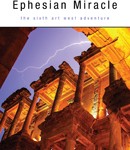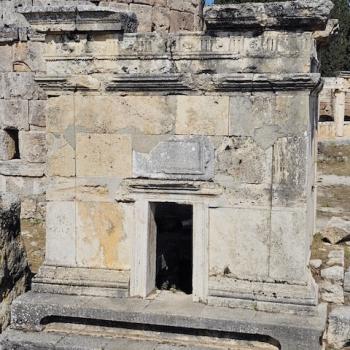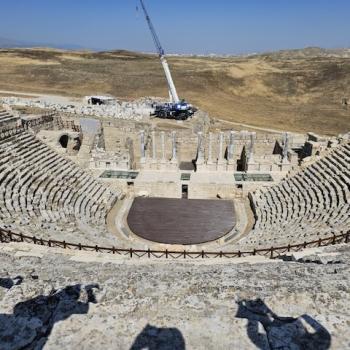There are important points along the way where Tom helpfully summarizes what he is arguing for or believes, and this helps provide clarity to the discussion. For instance on p. 710 we hear: “with both christology and pneumatology it seems that the normal assumption of many [modern] writers is radically mistaken. It is not the case that the NT is unclear or fuzzy on these subjects, and that the early Fathers invented a high view of Jesus and the spirit which was then wrongly read back into the early period. Rather, it seems as though the earliest Christians precisely from within their second-Temple Jewish monotheism, leapt without difficulty straight to an identification of both Jesus and the spirit within the divine identity, which the early Fathers then struggled to recapture in very different categories of hellenistic philosophy. As with christology so with pneumatology. The idea of a low Jewish beginning from which a gradual ascent was made on the dictates of Greek philosophy is exactly wrong. The Jewish context provided the framework for a thoroughly high christology and pneumatology and it was the attempt to restate that within the language of hellenistic philosophy and without the help of key Jewish categories, that gave the impression of a difficult doctrine gradually attained.”
Wright then explains why it was that there was not more discussion of the Spirit’s place within the Godhead in the NT period—“The spirit was not, for Paul and his contemporaries, a doctrine or a dogma to be discussed but the breath of life which put them in a position to discuss everything else– and more to the point, to worship, pray,love and work. We should not then be surprised at the relative absence of discourse, including monotheistic discourse about the spirit.” He draws an analogy between worldview and the Spirit– it is something you look through which affects your thoughts about other things, not something you mainly look at. Life in the Spirit was the gestalt or milieu which shaped all the early Christian thoughts.
Wright goes on on p. 711 to point out the context between the use of Temple language of the community and the individual Christian and the discourse about the Spirit. It is when the Spirit, the living presence of God, indwells something that it becomes a Temple, of course, and it is this living presence which sanctifies, creates holiness or set apartness and finally which unifies.
Tom thus concludes (p. 712) that Paul is saying that the founding of the church is the long awaited rebuilding of the Temple and that the long awaited indwelling of the Spirit is the return of Yahweh to Zion. “For the divine spirit to take up residence in the church is for Exodus 40 and Ezekiel 43 to find a radical, unexpected, even shocking new fulfillment.”
If however the promised return of God has been fulfilled in the incarnation and then by means of Pentecost, it is hard to see why it is in passages like 2 Thess. 2 Paul associates the return of God to judge the world with the second coming of Christ, not with either of the two events which have already transpired. It is even more difficult to make sense of all this when one realizes that God still has future plans for non-Christian Israel, as Rom. 11 makes clear. They are to be saved and regrafted into the people of God when the redeemer comes forth from heavenly Zion and turns away the impiety of Jacob (which is clearly not the church). In other words, the judging and redemption of God’s first chosen people, the establishing of God’s full kingdom on earth as it is in heaven etc. is most commonly associated in Paul with events which have not yet transpired. And it is precisely these ‘not yet’ events which raises questions about Tom’s interpretation of the ‘already’. Why not say Exod.40 and Ezek. 43 are best seen as being fulfilled when it involves a large number of Jews and has to do with their redemption and judgment, not with the church per se? At the end of the day, when you take Tom’s line of approach, Paul appears to be a person who muddies the water by indiscriminantly mixing the metaphors. And if you want to claim that texts like Exod. 40 and Ezek. 43 have both a present fulfillment in the church and later at the eschaton, this seems to be an attempt to have one’s cake and eat it too. By and large, the promises of YHWH’s return to ‘Israel’ are still awaiting fulfillment when Jesus returns again. This is not to say that Paul does not speak of the church and individual Christians as the eschatological Temple of God where the Spirit dwells. Clearly he does. What he does not do is apply those OT texts to that reality in the way Tom does. Indeed, Ezek. 37 and other such texts refer to the resurrection quite specifically of Jews only, or the restoration quite specifically of Jews/Israel only. They do not refer to the Pentecost experiences of the church and Paul does not suggest they do.
It is of course a difficult thing to determine when Paul is using OT language in a transferred sense to speak of the realities in which the church participates, and when he is actually suggesting that what was spoken to Israel is indeed now being fulfilled in the church (and so we do not look for a further fulfillment in Israel). When is Paul using Scriptural language to make a fresh or new point about God’s work in the church, and when may we assumes that Paul is drawing on the whole OT context of this phrase or that phrase to argue ‘this is the fulfillment of that’? It seems to me that Paul does both things (take for example his creative and playful midrashic exegesis in 1 Cor. 10– ‘the rock was Christ’ or in Gal. 4 where he associates Hagar with the earthly Jerusalem and the Mosaic covenant– in neither case are we talking about contextual exegesis), and discerning which is which is the key. It should not be the default that we simply assume the whole larger context of this or that OT passage or whole book when Paul draws on language from the OT.
Paul, like John Wesley, spoke Biblese, and so when Wesley called himself ‘a brand plucked from the burning’ after being rescued from the parsonage fire in Epworth, we should not simply assume that Wesley thought a text from the apocalyptic prophets was being fulfilled in his life. No, he was simply using appropos Scriptural language to describe his own experiences. That’s all. Paul from time to time does the same thing.
The idea of the Spirit as the coming of the Shekinah glory, the living presence of God, into the lives of believers can of course be found clearly enough in Paul (see p. 717), and it is a bit of a surprise that Tom doesn’t refer to 2 Cor. 3 where we are told that by the indwelling Spirit we are being changed from one degree of glory unto another. True enough, the Spirit, is Immanuel, God with us, just as ‘Christ in us’ is God with us. This however does not entail downloading the whole package of events mentioned in the OT when it refers to the return of YHWH to Zion. Some of those things are still outstanding, and are not currently happening in the context of the church, otherwise, Paul would never have spoken about the regrafting of temporarily broken off Israelite branches from the people of God back into the people of God when Jesus returns. Discerning which bits are being fulfilled and which bits are yet to be fulfilled requires careful exegesis and discernment. In any case, Tom is correct that when you speak of Christ in the same terms as you speak of the Spirit, of the divine presence of God, you have already included Christ within the Godhead.
On p. 718 Tom points out from Gal. 4 that Christ and the Spirit take the role of both the Torah and the tabernacling presence of God in the Mosaic period. And so ironically, Torah is seen now as something that should not be used to enslave God’s people (in particular Gentiles) since they have been set free from previous bondage to sin by Christ and Spirit. More in the next post.














